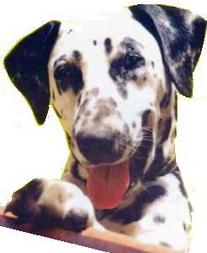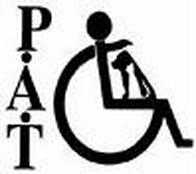Pets as Therapy
South Africa

What Is Pets as Therapy?
Pets as Therapy (PAT) is a registered non-profit and registered public benefit organisation that provides animal assisted activities (AAA) – unstructured, casualtherapeutic visits by volunteers and their pets. PAT provides assessment, registration, support, and insurance for volunteers and their pets (mostly dogs). Most pet owners get much pleasure from the relationship they have with their pet. PAT volunteers share the joy and love of their animal companions with others and PAT’s role is to help facilitate this process.
Founded in 2001, PAT currently has more then 180 registered volunteer handler/dog teams (2011) and visits more than 85 institutions nation wide with branches in Cape Town, Stellenbosch, Polokwane, Port Elizabeth and East London. A branch in Durban is in the pipeline!
Why Pets as Therapy?
The objective of PAT is to bring company, comfort, stress relief, and joy to those either living temporarily or permanently in special care facilities, special needs schools, group homes, long term care facilities, nursing homes, hospitals, hospices, schools and a variety of other venues.
It has been known for years that pets can be good for health and well-being. There is a wealth of scientific evidence that interaction with an animal can have therapeutic benefits – psychologically and physically. Visiting animals can help alleviate loneliness, anxiety, depression, provide a distraction from pain or be a welcome change from institutional routine.
Animal assisted activities (AAA) and Animal assisted Therapy (AAT)
(As defined by the Delta Society)
AAA provides opportunities for motivational, educational, recreational, and/or therapeutic benefits to enhance quality of life. There are no specific treatment goals, visits provide “meet and greet” opportunities that are unstructured and casual. The volunteer and pet need no specialised training.
AAT is a goal-directed intervention in which an animal that meets specific criteria is an integral part of a therapy program tailored for a specific person. AAT is delivered by a health/human service professional with specialised expertise, and within the scope of practice of his/her profession.
Therapy Dog requirements
While many dogs provide companionship in the home, not all dogs have the temperament and social skills suited to be a therapy dog. Each prospective dog/handler team is assessed for suitability, and then matched with an institution suited to the dog. Behaviour and temperament are carefully assessed. The handler/dog team must demonstrate the appropriate skills to safely interact with people. Dogs of any breed, size or age may be eligible. The therapy dog candidate must be friendly, confident, socially motivated, well socialised with people - men, women, children of all ages, shapes and sizes, accept and be comfortable with being handled by strangers, behave and respond appropriately in different environments, and when encountering new stimuli. The dog must be under reliable control of the handler, and not display any behaviour that may be problematic. Pets must be clean and healthy; proof of vaccinations along with a veterinary certificate stating the animal is fit and healthy is required. PAT also requires animals to be on a parasite (flea/tick/worm) control program.
Therapy Dogs are not service dogs. Service animals are specifically trained to do work or to perform tasks for the benefit of a person with a disability.
The welfare of PAT animals
The welfare, safety and care of PAT animals and the people being visited are of utmost importance. An animal is never to be put in a situation it is not able to cope with. Because behaviour is not static, and is subject to change, PAT volunteers are to report any changes or concerns with regards to their animals.
A PAT animal that shows signs of stress or distress when visiting is to stop visiting and it must be reported to PAT.
PATdogs have the right to priority consideration in the conduct of their role.
For more information please visit the PAT website: http://www.pat.org.za
Compiled by Yolande Ginsberg
Applied Animal Behaviourist (COAPE, UK)
BA (Health Sciences And Social Services) Psychological Counseling
PAT Assessment coordinator Cape Town-Northern/Southern Suburbs
This article is copyrighted and remains the property of the author. Individuals are welcome to print or copy same for their own use in furthering their knowledge of dogs. However, no reproductions or alterations/variations are allowed without the express written consent of the author.

